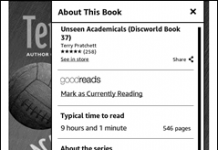Well, it was bound to happen sooner or later, and I’m glad it did. The local NAACP and others in Rockford, Illionois, are protesting the local library system’s plans to spend about a quarter of its $1.19-million collection budget on e-books. And I can understand the anger of the low-income protestors, who fear they’ll lack the resources to enjoy the digital books.
Making 50 Kindle e-readers available for loans—what the library system proposes, according to a report in American Libraries—won’t be enough. The number is pathetically small, given that more than a fifth of Rockford’s 153,000 people live in poverty.
Complicating matters is that someone at the top of the wait list for a Kindle may not be able to access to e-book that he or she wants, because it, too, has a list. Alas, Rockford’s local issues here can’t be separated from the need for a well-stocked national digital library system serving the entire country, not just the upper socio-economic groups. With all expenses considered, libraries are paying more for e-books than they should, and quite logically, skeptics worry about recurring costs. The best solution would be a national digital library system with a robust ecosystem to give it enough leverage to bargain fairly but effectively with publishers while respecting traditional library values. I’d also recommend that content providers and libraries spend less time fighting the copyright wars and more time fighting for library budgets at all levels of government. The more library books and other media available via libraries, the less of a piracy problem.
For now, in Rockford’s place, I would greatly increase the number of e-books purchased but not to the level now planned, considering the risks of current e-book licensing arrangements and the large number of people in the town without the financial resources or the knowledge to deal with e-books.
Meanwhile, without splurging, I would cautiously experiment with used iPads, suitably configured Android tablets, or other devices that low-income people could use for many applications such as library books, early childhood education and family literacy, e-forms and interaction with social workers, healthcare providers and teachers. Net video is cheap to use and endlessly more engaging than the telephone alone. I would not rely on the gadgetry to reduce traditional face-to-face contact, rather to augment it.
What’s more, librarians and teachers ideally could offer both technical support and the literacy-related kind, and local agencies, such as those providing healthcare and other services, would be suitably equipped. Early childhood education would be my favorite of all the apps—here are some specifics. Yes, that’s deep in Reinventing Government territory, but worth the time and money to try out in a small way, given the potential savings down the road.
If less adventureous, I would at least check with an e-reader maker about buying up a number of used machines and give away as many as I could afford to low-income people. Bought in bulk, used e–readers might go for $60 or $70.
Those are the kinds of issues I’ve been begging the Digital Public Library of America to take action on, either directly or through alliances with other organizations of all kinds. Unless the DPLA and others pay more attention to the needs of the nonelite, e-books will widen rather than close up the digital and academic divides.
(Via LibraryCity.)

































The issue of ebooks at public libraries will be solved real soon, fear not.
Penguin and Harper Collins will follow the lead of their price-fixing partners and stop supplying ebooks to libraries altogether.
I’m minded of Niven&Pournelle’s Crazie Eddie moties; doing the idealistically correct thing at the worst of all possible times. With libraries under funding pressure, ebook costs rising, publisher restrictions making it more troublesome and less useful, and now political pressure in an election year?
Why shoudn’t libraries just cave and zero out ebook lending altogether?
No need to worry about a library ebook access gap then, as the only ebook library left will be Amazon’s.
By the nature of things lower income groups will be late adopters in respect to acquiring the devices. As for access to the content… I suggest filesharing which is at least available to them right now as opposed to your library scheme, which is actually never going to be implemented, sorry.
With libraries hobbled, lending crippled and used ebooks a fantasy this is pretty much the only option left to them.
The NAACP and the usual left wing groups are, as usual, misguided and wrong.
Firstly what is low income exactly ? If it means working class … then in my experience the working classes tend to spend disproportionately on gadgets such as TV, cable, satellite tv and mobile phones. I have lost count the number of acquaintances of mine over the years who earn very little and more often than not are on welfare, who have bigger tvs than me, better mobile phones and better satellite channels.
These people are well able to afford a basic kindle and once acquired they will save huge amounts of money on eBooks and be able to read more and learn more.
If they mean the seriously low income people; those really on the verges of poverty, then they may have a point. However the truth of the matter is that there are plenty of paper books still in the library system, and they have more to worry about than eBooks.
This kind of posturing by these groups is nothing more than cheap politicking.
The author is basically arguing that access to ebooks is a “right” for all the citizens of Rockford, Ill (And everywhere else, I presume). Where does the concept of an economic entitlement society end? With ebooks or, how about private jets?
I grew-up economically challenged. I never expected someone else to pay for what I wanted (Or thought I needed). My goal was to changed my circumstances to be able to pay for my own stuff. Maybe a few more “poor” people need such an incentive instead of arguing about how to spend other peoples money for their own benefit.
FWIW, I’m all for helping those who cannot help themselves or need temporary assistance. However, our society has gone way beyond charity to the point where too many expect someone else to take care of them.
I have to agree with Howard.
I consider myself lower middle class and I live in an inner city neighborhood in the MidWest. My neighbors are either at or below my income level, but I can’t help but notice that I drive the oldest car on the block. I also can’t help but notice all the huge TVs I see in windows when I walk past. Surely, anyone who can drive a new car and enjoy a big screen TV could find $79 to purchase a Kindle if they wanted to.
Of course, if that happens, they’ll have to go elsewhere to borrow e-books. We have a library branch just two blocks away, but you won’t find many books there–paper, e or audio. There is one 20 foot wall of adult books, one 8×10 foot children’s room and an audio book “section” consisting of one small carousel holding maybe 20 tapes.
What you will find is shelf after shelf after shelf of movie DVDs and music CDs.
Really, the digital age has obsolesced the local brick and mortar library. A national library and ubiquitous access to the Internet is what will address this concern best. These are no longer luxuries but essentials to democracy and economic development.
Hey, folks, library e-books will actually be cheaper for the taxpayers than p-books will be in the long run if publishers make e-books available to libraries without gouging.
That’s one reason why I want a robust national digital library system to help drive down per-book costs through increased leverage.
Yes, physical libraries spend big bucks to store and process paper books.
At the same time, the cost of e-book-capable hardware will be going down. But not everyone is a tech guy or gal with the skills to use the devices, and they’re not already at, say $25—hence, the need for local help.
Furthermore, brick-and-mortar libraries offer lots of services such as storytelling hours and reference and promotion of family literacy. Children tend to read more and do better in school if parents read more. Role models count. We’re talking about literacy, not free private jets.
I say: Scale down the buildings but keep a neighborhood presence and increase services.
And don’t forsake the actual and potential library users who need libraries the most—especially if we want to upgrade the workforce to compete better with the Chinese and the rest of the world. Labor force quality is hardly the only factor. But raising it won’t hurt.
Now–about file sharing. I’m delighted Alfred mentioned that as an alternative. I hope the ALA sees his comments and uses them as an argument with content providers who refuse to deal fairly with libraries. At least libraries pay one way or another for content.
Thanks,
David
Low income???? What, are we going to continue separating the masses and condemning those who are successful? I am sick to death of categorizing people, being politically correct and feeling sorry for those who do not have. A LOT of them just need to stop feeling ENTITLED and get off their butts and WORK. If you want something, WORK TO GET IT, not complain about it. Sell that $2000 TV you put on credit, or that Cadillac or motorcycle YOU JUST HAD TO HAVE when you had no money, and then consider buying one.
This country seems to have an ENTITLEMENT mentality, demonizing those who do have a work ethic and therefore, have more than others. Is it right to condemn them for being successful? NO. IN FACT, IT IS EVIL TO DO SO. So what side of God are you on anyways. He wants HIS people to be successful not ENTITLED. We are a nation of giveme, giveme, gimme. shame on all of you!!!
What a pathetic bunch of comments. You have time to blog here and complain about the poor. So, WHY AREN’T YOU WORKING?
This whole lending model is an obsolete one anyway.
David talks about a National eLibrary. What is that ? Is it intended to include essentially all or most published works ?
Think about it … if there were such a library … why would anyone ever buy an eBook again ? All they have to do is ‘borrow’ it for free and read it. What does that do to the writing/publishing business model ? it kills it stone dead ! it makes no sense.
The whole ‘borrow’ and ‘lending’ concept is defunct in a world of eBooks. It is an attempt to imitate the old paper model. But it is simply unworkable and doomed to failure.
What we need, and it will come, is a state of affairs where eReaders become cheaper – under 50 or 60 dollars – and eBooks settle at a price between 2.99 and 5.99. That will empower the vast majority of the population of the developed world to read everything they have time to read.
Then for those who are genuinely poor, who simply cannot afford to read, the Gov can implement an online welfare voucher system whereby books can be accessed by those people at little or no cost. This will empower the real poor to access deeper, more comprehensive and effective reading and educational materials than ever before.
Libraries can be done away with and the huge costs being ploughed into them can be spent on more worthwhile projects, including the online welfare voucher system. Libraries offer no other service of any value that is not and cannot be supplied in other cheaper and better ways.
Yes, let’s get rid of the libraries and instead move to a system where the government can provide access to books for little or no cost! Great idea, Howard!
Most of the library budget doesn’t go toward acquisitions, it is for salary. What good is an eBook system if people don’t know the options available to them or how to access them? Also, we are talking about $40 per person for the current library system which, in theory, provides a massive amount of leverage for our population.
Book sales aren’t going to die with a solid eBook library (just as they haven’t with the current library system). I don’t know about everyone, but my peers still buy books largely because it takes longer than two weeks to finish a book, they sometimes want the title as reference item, they don’t wish to wait, they want to support the author, and because it is easier to simply purchase.
eBooks in the library system do offer many benefits, but many publishers are strangling the idea. It may be worth exploring a strong national library where the purchaser has more influence (similar to pharmaceutical purchases in the UK), but I’m not ready to divert funds from my library to try it out.
Logan Kennelly:
“Yes, let’s get rid of the libraries and instead move to a system where the government can provide access to books for little or no cost! Great idea, Howard!”
Why thank you. I think it is the best and most efficient idea for the really poor.
“Book sales aren’t going to die with a solid eBook library (just as they haven’t with the current library system)”
The difference now being that instead of having to travel physically to libraries, and having to travel physically to return them, and having limited book lists in libraries …. borrowing would be one click away. That is a major major difference. Why would anyone except the really slow reader buy instead of borrow ??
It doesn’t make sense. And when something doesn’t make sense, it rarely succeeds.
The NAACP does know that the people who fund libraries are taxpayers who by virtue of their money ALSO have a right to certain materials THEY might want. By default, low income people pay nothing in taxes. Unless the NAACP wants to make up the difference in the library budget they should shut up about it.